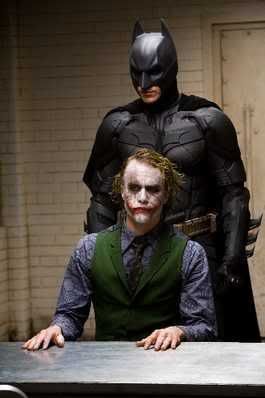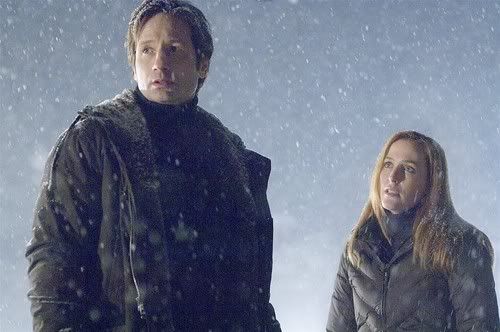 [Shrugs shoulders]
[Shrugs shoulders]
It was okay.
I didn’t really 'get' the early hype, and I don’t really 'get' the crazy response. Frankly, I thought The Dark Knight was a solid, if convoluted, mainstream superhero movie—much better than, say, X-Men: The Last Stand, while fitting comfortably alongside the occasionally-great-but-overall-just-pretty-good Spider-Man 2.
The thing is, I thought the Joker was under-utilized; that the bulk of the story—at least the stuff important in “ the long-run,” the kind of things that matter to Batman (the character, as well as the entire movie franchise)—seemed really to center around Harvey Dent, and his symbolic transformation into Two-Face. Everything with the Joker felt like a really long middle Act, between the mobsters and the money, through to Dent’s corruption. The Joker was too much like a diversion, or, perhaps more fittingly, a narrative tool, with which to kill Rachel Dawes and burn off half of Dent’s face. Where was the meat? I’m all for symbolism (and don’t you think that the story was really about Batman and the Joker’s battle for Harvey’s soul? And the soul of the city?), but, c’mon!, aside from setting up a couple kick-ass set pieces (the opening bank robbery; the car chase), what’d the Joker do? Mixed things up a little? Put a wrench in the machinery? Maybe so, but where’s the payoff? Citizens are saved, Dent’s legacy lives on, the wrench was removed, and the Joker is literally left hanging, while a couple of heretofore unimportant (and, narrative-wise, unrealized) crooked cops get offed, and a disappointingly lousy showdown between Jim Gordon and Two-Face happens across town. Really? Didn’t the Joker deserve more?
Well... About the Joker: he fancies himself an instigator, and, really, that’s all he is. He wires the oil drums to detonators, for example, and his part is over—the action is in the hands of the characters on the ferries, and now it’s them (and what happens to them) we’re interested in. But, gosh, if that doesn’t diminish his role as a villain. For me, that’s the major flaw of The Dark Knight. Or at least part of it. I believe that in order to compensate for the Joker’s ancillary role in the story (the “mad dog,” “let off the leash” by the ‘real’ bad guys), Nolan and Ledger took the Joker’s sociopathic personality to the extreme. They had to, otherwise the Joker would have been a dud. As it is, he’s a psychopathic murderer, as twisted as Jigsaw from the Saw movies. Is this a good thing? I feel uncomfortable saying that it is, largely because I’m not sure what we’re meant to think about him. Should we envy his nihilism? Are we meant to react positively to his casual attitude towards life? I get the feeling that when the Joker jokes, we’re supposed to laugh. When he kills a man with a pencil, we’re supposed to think how clever he is. When he burns a literal ton of money, we’re supposed to see it as an act of liberation. When he blows up a hospital, we admire the fireworks.
And that’s fine, I guess. You could argue that that makes him a good villain, and I would, of course, understand your point. He’s mesmerizing, in a way. In his speech in the hospital, to the newly two-faced Harvey, the Joker talks about hating “schemers” and their “plans.” He says, “If I tell the press that tomorrow … a truckload of soldiers will get blown up, nobody panics”—because deaths like these have become part of the status quo. There is an allure to what he says, because it sounds tragic and unjust. His argument is tantalizing, and what he says quickly starts sounding like…truth. And, neatly, this line of reasoning by the Joker—who is tarted up in a candy striper’s uniform (okay, acquiring that costume must’ve required some sort of forethought and planning, right, Mr. J?)—inflames Harvey so much that he concludes that the system is at fault for it’s own corruption. His own corruption. That the ‘system’ allowed the Joker to kill Rachel. The ‘system,’ as represented by Batman, and Lt. Gordon, and Harvey himself. Interestingly, this message is echoed by another character later in the movie: “You crossed the line first, sir. You squeezed them, you hammered them to the point of desperation. And in their desperation they turned to a man they didn’t fully understand,” argues Alfred to a disenfranchised Batman. Somehow, it seems, the Joker has convinced us that he is the hero of Gotham City, and maybe of The Dark Knight—or, at the very least, that he is a necessary, and perhaps even innate, evil.
The problem is, I don't know if I believe what that last sentence implies (that there can be no order without chaos, or that you have to break the rules to succeed). I could go on and on about my complicated response to Heath Ledger's Joker, and, accordingly, The Dark Knight itself (because, after all, isn't so much of The Dark Knight's success linked to the Joker?). But just understand this: in a twisted, ironic way, I like the movie less because it's so damn popular. I don't want to sound snobbish or out-of-touch, but why are people so damned passionate about such a demented, terrible, perverted killer? What does it mean when 6-year-old kids are playfully asking if their friends want to know how they got these scars?, or that you can "Become a Fan of" The Joker on Facebook? Why is this movie, and particularly this character, striking such a nerve, especially with young people? The more I think about it, the more frustrated I get. Are we all just closeted nihilists and anarchists? What does it mean if we are? so I'll stop.
Sigh. I don’t know. If I stop all this analyzing (or, you might easily argue, over-analyzing), then I’m afraid I’ll feel the opposite effect from what you’d expect: I’d like The Dark Knight less. It’s made with master craftsmanship, and it looks and sounds fantastic. When all the gears are aligned, it hums along with a satisfying briskness and ingenuity. But, it’s just…well, I like my big budget movies to be a little bit more than mindless, populist crowd-pleasers, packed with as many explosions, gadgets, and one-liners as the focus groups found appropriate. I like it when my movies think. So I understand that the Joker, as a character, was carefully constructed by Chris Nolan, his co-writers, and especially Heath Ledger, to arouse certain responses, and that it was an intentional choice to keep his origins elusive and his underlying motivations murky. I just don’t think I responded all that favorably to their creation. Maybe I just don’t like chaos.
But at least I can take a little comfort in one thought: With The Dark Knight grossing in excess of $400 million, following one of the most carefully planned marketing schemes in Hollywood history—for a Warner Bros. release that was meant to be the studio's (a subsidiary of Time Warner Inc., by the way) biggest summer tentpole release, no less—it's refreshingly ironic to think that as we passively participate in the status quo in such a ‘meta’ way, the Joker would be sitting back and laughing at us all?
 It’s like I Want To Believe is the most mature episode of The X-Files never aired. That’s not necessarily a knock at the long-running show—which, in it’s day, was the kookiest, scariest, most mystifying(ly good) series on TV. After all, the show was, by it’s nature, irrational, improbable, and occasionally naïve—thrilled by the possibility of truth within (normally) unbelievable situations. But time has passed, and while I won’t argue that the world is a categorically different place than it was in 2002 (when The X-Files went off the air), it seems more than appropriate that former FBI Agents Mulder and Scully have adapted to a new status quo. In I Want To Believe, it’s like Mulder and Scully grew up, and went from being characters on a sci-fi TV show to being real people with real dilemmas …who occasionally dabble in the supernatural.
It’s like I Want To Believe is the most mature episode of The X-Files never aired. That’s not necessarily a knock at the long-running show—which, in it’s day, was the kookiest, scariest, most mystifying(ly good) series on TV. After all, the show was, by it’s nature, irrational, improbable, and occasionally naïve—thrilled by the possibility of truth within (normally) unbelievable situations. But time has passed, and while I won’t argue that the world is a categorically different place than it was in 2002 (when The X-Files went off the air), it seems more than appropriate that former FBI Agents Mulder and Scully have adapted to a new status quo. In I Want To Believe, it’s like Mulder and Scully grew up, and went from being characters on a sci-fi TV show to being real people with real dilemmas …who occasionally dabble in the supernatural.




